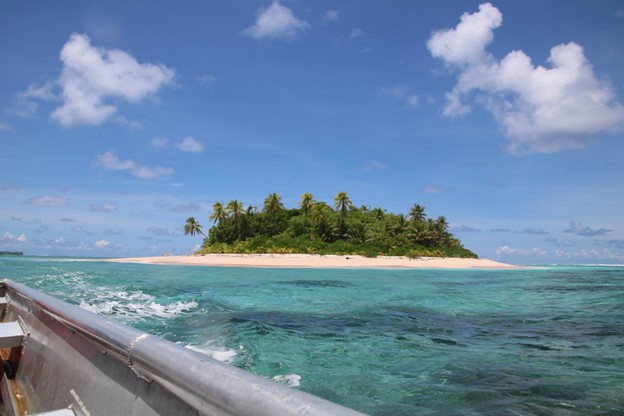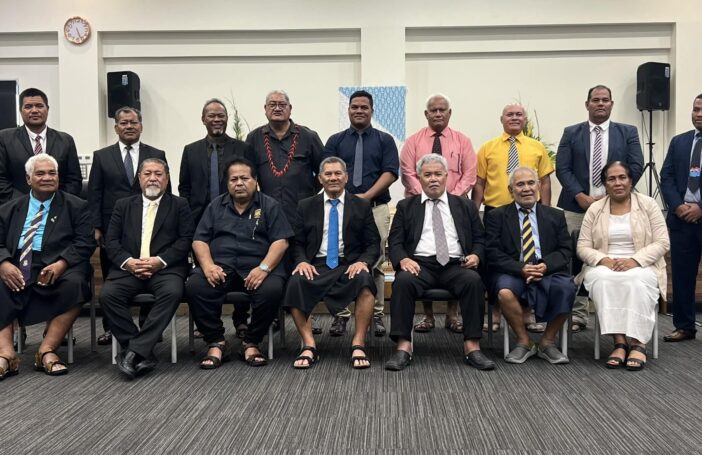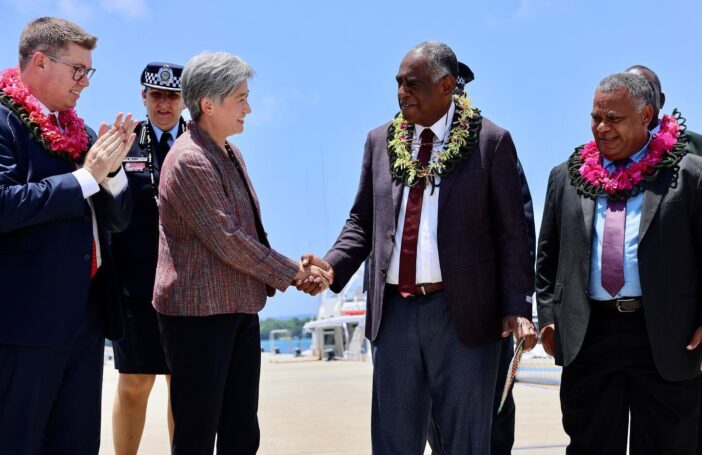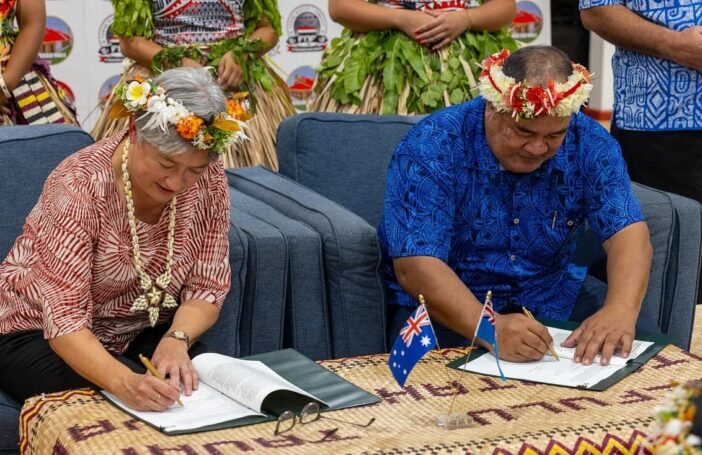The announcement of the new Australia-Tuvalu Falepili Union on 10 November 2023 at the 52nd Pacific Islands Forum (PIF) Leaders Meeting in the Cook Islands has generated widespread media attention. With claims that “Australia has struck the ‘most significant’ Pacific agreement in its history with the tiny island nation of Tuvalu”, news media have focused on a pathway established by Australia to allow Tuvaluans access to Australia in response to the threat of climate change.
News media have also focused on the provision in Article 4 where Tuvalu would cede seemingly wide-ranging security and defence control to Australia, with the assurance that:
Tuvalu shall mutually agree with Australia any partnership, arrangement or engagement with any other State or entity on security and defence-related matters. Such matters include but are not limited to defence, policing, border protection, cyber security and critical infrastructure, including ports, telecommunications and energy infrastructure.
This specific clause on cooperation for security and stability is largely seen as part of an attempt by Australia and other Western powers to “secure” the Pacific against the influence of China.
These points of media focus are indeed critical. The security and stability portion of the Union indicates a highly neocolonial Western influence as Australia gains a say in virtually any matter that could be considered as relating to Tuvalu’s security and defence.
However, given that Tuvalu’s Parliament will dissolve in approximately two weeks, and the current Cabinet will go into caretaker mode as elections for the new government approach, it is questionable whether the Union will last in the long term. Prime Minister Anthony Albanese has noted that both the Australian and Tuvaluan governments have yet to formally approve the Union, but under Tuvalu’s Constitution, a Cabinet cannot make any major policy decisions or enter into significant contracts or undertakings while in caretaker mode. If Tuvalu’s government changes after the upcoming elections, a new government may simply dissolve the Union.
Yet, despite questions as to the longevity of the Union, what has been left out of some media analysis of the agreement is the integration of Tuvalu’s foreign policy goals and cultural values into the document, which has represented an objective of the Tuvalu government since 2020. It also links to major decisions made as part of the PIF Leaders Meeting.
Two striking aspects of the Union are its integration of the main concepts underpinning Tuvalu’s 2020 Foreign Policy: Te Sikulagi – that is falepili (being a good neighbour) and kaitasi (shared responsibility) – and its acknowledgement that Tuvalu’s statehood will be maintained in perpetuity despite the impacts of climate change.
Tuvalu’s 2020 Foreign Policy takes a values-based approach to diplomacy, interweaving Tuvaluan values into the practice of international relations and asserting that Tuvaluan culture and values are “uniquely suited to guiding international relations in today’s interconnected world”. The Foreign Policy specifically highlights falepili and kaitasi as Tuvaluan values that should be forwarded in the realm of international diplomacy, and although these two ideas are merged under the term falepili in the Union, they are both represented in the document. The Union emphasises both “good neighbourliness” and an intertwining of mutual respect and interest. Although this integration of Tuvaluan concepts in the Union can be viewed cynically as Australia leveraging Pacific values to further its own security concerns, a more empowering approach is to recognise the strength of Tuvalu’s foreign policy goals in ensuring an emphasis on customary values and practices in any bilateral document to which it is tied.
More importantly, Article 2 of the Union makes a significant statement in recognising that “the statehood and sovereignty of Tuvalu will continue, and the rights and duties inherent thereto will be maintained, notwithstanding the impact of climate change-related sea-level rise”. It echoes Tuvalu’s 2020 Foreign Policy which states that “Tuvalu insists that all countries forming relations with Tuvalu recognise the statehood of the nation as permanent”.
As explained in a recent blog I co-authored with Tuvalu’s former Foreign Minister Simon Kofe, the newly amended Tuvalu Constitution asserts a similar vantage point in stating that, “The State of Tuvalu within its historical, cultural, and legal framework shall remain in perpetuity in the future, notwithstanding the impacts of climate change or other causes resulting in loss to the physical territory of Tuvalu”. This represents a new area of international law that has been somewhat contested as there was previously no need to codify what statehood and maritime boundaries would look like if nations were so deeply affected by climate change that they would lose their land territory. Now that sea-level rise threatens territorial integrity, Tuvalu has been pushing for other countries to recognise its statehood as permanent so that it can remain a sovereign nation even in the event it has no land.
Prior to the Union, the government of Tuvalu had signed at least nine joint communiques with other nations, including Vanuatu, Palau, and Niue, who agreed to recognise Tuvalu’s statehood as permanent despite the effects of climate change. Part of the Union, then, represents Australia’s concession to Tuvalu’s foreign policy goals – goals it had not previously agreed to recognise since the 2020 Tuvalu Foreign Policy was established.
This sentiment has also been powerfully reflected in the 52nd PIF Communique, which has endorsed the 2023 Declaration on the Continuity of Statehood and the Protection of Persons in the Face of Climate Change-Related Sea-Level Rise. Similar to Tuvalu’s Foreign Policy, the Declaration asserts that “the statehood and sovereignty of Members of the Pacific Islands Forum will continue, and the rights and duties inherent thereto will be maintained, notwithstanding the impact of climate change-related sea-level rise”.
Although the security aspects of the Union raise serious concerns about problematic neocolonialism and increased Western influence in the Pacific region, Tuvalu’s ongoing work to elicit concessions from its diplomatic partners, especially regarding its continued sovereignty and access to maritime resources, should not be overlooked.






Thanks Jess, for your always insightful views about ‘our’ favourite corner of the Pacific.
Clare
Very useful analysis, thanks Jess!
Thanks, Terence!
Great, Jess, ffetai.